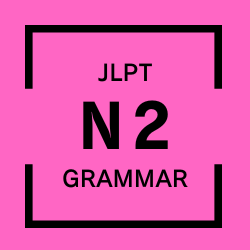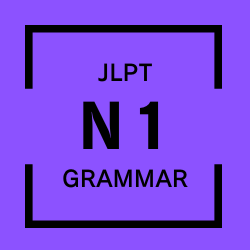例文
彼は嘘をつき、人を傷つけたにもかかわらず、自分は悪くないと言い出す始末であった。
He had lied and hurt people, yet he started to say that it was not his fault.
意味・用法
「~始末」は、それまでの過程や経緯などを述べた後に、最後には「~」という状態だと、そのことを批判的に言いたいときに使われます。
英語
"~ shimatsu" is used after describing the process or events up to that point, and then to say critically that the state of affairs is "~" at the end of the process.
詳しい文法解説 grammar point
▷ 使われ方
何等かの過程や経緯が述べられた後で、「~始末」が使われます。「~上に」「~あげく」といった文型が一緒に使われることがよくあります。
1. 彼はギャンブルにはまり、借金を重ねた上に、友達にまでお金を借りる始末であった。
He was addicted to gambling, racking up debts and eventually borrowing money from his friends.
2. 上司の怒りは収まりがつかず、彼女のミスをさんざん叱ったあげく、彼女の人格まで攻撃する始末だった。
The supervisor's anger was uncontrollable, and after scolding her extensively for her mistakes, the supervisor attacked her personality.
悪い状態
最終的に何か良くない状態が起こった場合にそれを批判的に述べるために使われ、最終的に良い状態になった場合には使われない。
3. 彼は給料が上がった上に、昇進までする始末であった。✖
接続 formation
V(辞/ない) + 始末だ
関連文法 related grammar

~あげく
- JLPT N2 Grammar

~末に
- JLPT N2 Grammar

~わ~わで
- JLPT N1 Grammar
例文 example sentences
・彼は出された料理を残した上に、ごちそうさまも言わずに帰る始末だった。
He left the food that was served to him and did not even say "gochisoso sama" before leaving.
・その若者の集団は、さんざん散らかしたあげく、掃除もせずに帰る始末であった。
The group of young people made a mess and left without cleaning up.
・彼は同僚を批判し、会社の体制に文句の限りを述べたあげく、社長にまで盾突く始末であった。
He criticized his colleagues, complained about the company's structure, and even went so far as to go up against the president of the company.
・彼女はパニックになったあげく、人目もはばからずに泣き出す始末でどうしようもない。
She panicked and started crying in public, and there was nothing we could do.
・私の妻はアイドルにはまり、コンサートに行くに飽き足らず、生活費を削ってグッズを買いあさる始末であった。
My wife was hooked on idols and not satisfied with just going to concerts; she cut into our living expenses to buy all the merchandise she could afford.
・彼は自堕落な生活を続け、酒は飲むわギャンブルはするわで、そして終いには薬物にまで手を出す始末である。
He continues to live a life of self-indulgence, drinking, gambling, and eventually turning to drugs.
・彼のせいで社員みんなに迷惑がかかったのに、彼は謝るどころか自分のせいではないと言い出す始末であった。
He was causing trouble for all the employees, but instead of apologizing, he insisted that it was not his fault.
・戦争は激化を極め、国は女性やまだ年端も行かぬ若者まで戦場に送りだす始末であった。
The war was raging intensely, and the government began to send women and even young men into the battlefield.
・彼は気分が良くなったのか、さらに大量に酒を食らい、終いには裸で踊り出す始末であった。
He felt better, consumed more alcohol, and ended up dancing around naked.
・学校は休むわ、けんかはするわ、終いには警察のお世話になる始末で、親もほとほと彼には手を焼いていた。
He missed school, got into fights, and eventually ended up in police custody, and his parents had a hard time dealing with him.

If you have any questions about this grammar, please comment below.
